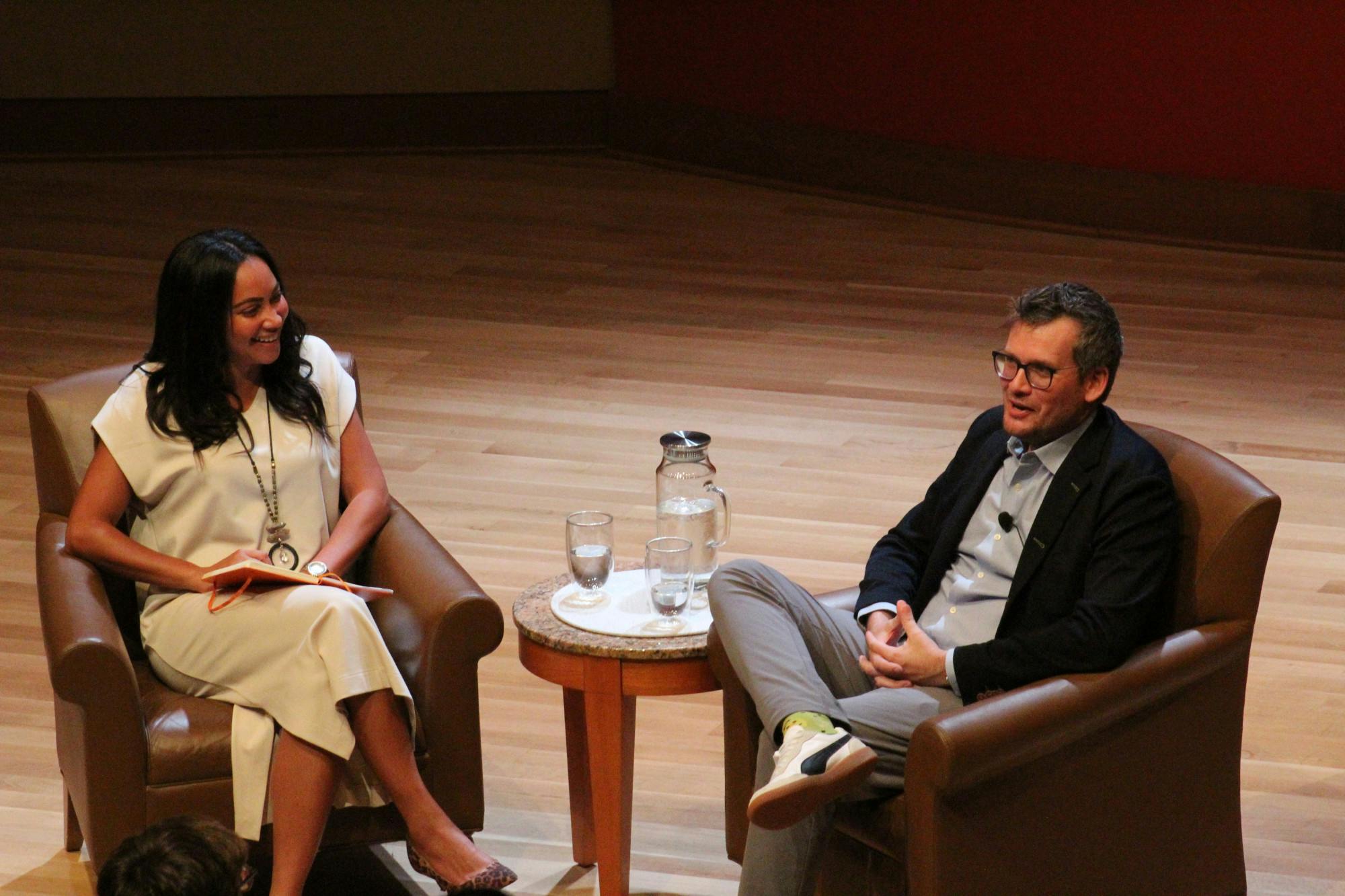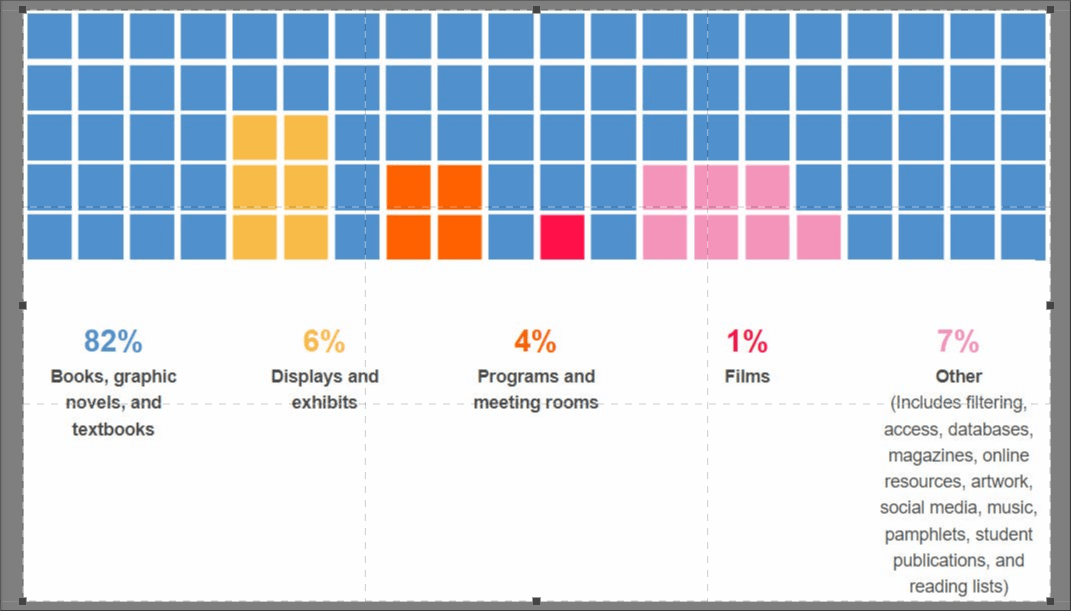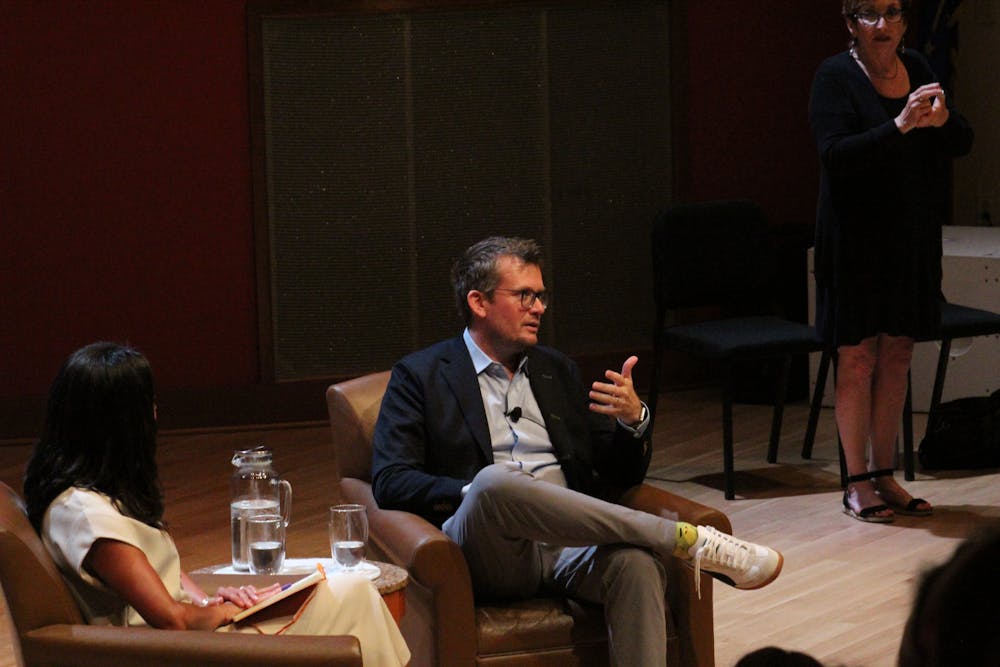This year, Banned Books Week took place from Oct. 1-7. The Indianapolis Public Library kicked off the week with a discussion featuring John Green at the central location on Oct. 2.
Green is a New York Times bestselling author and Indianapolis resident. He has been vocal about the effects of book bans, and has even had one of his novels, “Looking for Alaska,” challenged throughout the country. According to the American Library Association (ALA), “Looking for Alaska” was the fifth most challenged book of 2022, having been challenged 55 times.
Green was joined on stage by Senator Andrea Hunley, who previously served as both an English teacher and principal in Indianapolis.

John Green and Andrea Hunley discuss challenged and banned materials
Locally, in Hamilton East Public Library, Green’s book “The Fault In Our Stars” was moved from the young adult section due to sexual references. During the discussion, Green referenced the idea that young adults are already fully aware of the concepts that are being used as reasoning behind banning books.
“And, what I really want from discussing those themes in my books, is for kids to feel less alone because there is no way for them to live in a world without death, without grief and love and fear and all the big things that we live with,” Green said. “But, maybe, if they can feel less alone in those experiences through story, I just know that made a big difference for me.”
In recent years the ALA reported record high numbers of books being challenged, documenting 2,571 unique titles falling under attempted censorship in 2022. Preliminary data for 2023 shows that from Jan. 1 to Aug. 31, there were challenges directed towards 1,915 unique titles.
Many challenged and banned titles are by, or about, people who are Black, Indigenous or people of color, along with people in the LGBTQ+ community. Green emphasized that he is an “utter anomaly” on the list of authors as a white, heterosexual and cisgender man.
“And the vast majority of books that are being pulled are books by or about people of color, LGBT people, other marginalized communities,” Green said. “I think that that is deeply fear based. It's about trying to marginalize those people. It's about trying to stand with the systems that would marginalize them, and work against the reformation of those systems that would create a more equitable and just society.”
Along with being vocal about the importance of recognizing authors and stories related to marginalized groups, Green also heavily discussed the education and library systems. In 2022, 51% of challenges were found in schools or school libraries and 48% were found in public libraries.
“Kurt Vonnegut, our favorite literary son, once said, ‘The America I love still exists at the front desks of our public libraries.’ And I think that's such an important observation,” Green said. “That is what makes the library special, that it allows equitable access to information for everyone. And that ability to have access to the world's information, carefully curated by talented librarians, whom we trained and paid and hired to do this work, I think is one of the best things about America.”
Libraries don’t just represent access to books, they provide a large variety of resources and programs. To illustrate this idea, the theme of the 2023 National Library Week was “There’s More to the Story.”
“Library programming brings communities together for entertainment, education, and connection through book clubs, storytimes, movie nights, crafting classes and lectures,” the “I love libraries” page of the ALA states. “Library infrastructure advances communities, providing internet and technology access, literacy skills and support for businesses, job seekers and entrepreneurs.”

Books are not the only materials being challenged in libraries. Photo courtesy of the American Library Association.
All of the educational and community opportunities that culminate in both public and school libraries are meant to provide resources for large varieties of people to learn from and be represented by. If librarians and libraries do not have the capability to provide these materials and services without facing censorship, essential systems are unable to function.
“The social order has made this collective decision that we should educate our population,” Green said. “If we're going to live in a democracy, we should offer people lots of educational opportunities to be able to fully participate in that democracy in an informed way. Education is not just for parents and kids, it's also for society, for all of us. We all are better off when we share a world.”
Within a large variety of opportunities, stories from and about marginalized groups allow a larger range of perspectives. These stories can provide representation for members of these communities, or allow those who have had different experiences to gain an understanding of others.
“Part of what is so frustrating about this is that a lot of the books that get banned are the books that most need to be in libraries. And the books that kids will benefit most from reading and may not be able to afford to buy their own copy. That's why I think we have to continue to fight to keep these titles in libraries prominently,” Green said. “But an important thing that we can do as well is to support the writers who are getting marginalized, and those who are representing marginalized people.”
Banned Books Week highlights the importance of freedom of speech and equal access to literary materials. To stand with Green and other authors who have faced challenges or bans, visit the ALA’s guide and find ways to get involved.
Ashley Wilson (she/they) is a junior double majoring in Creative Writing and Journalism with a minor in Classical Studies. She is the Campus Editor of The Campus Citizen. In her free time, she can be found crocheting, reading, or crying over Doctor Who edits.





